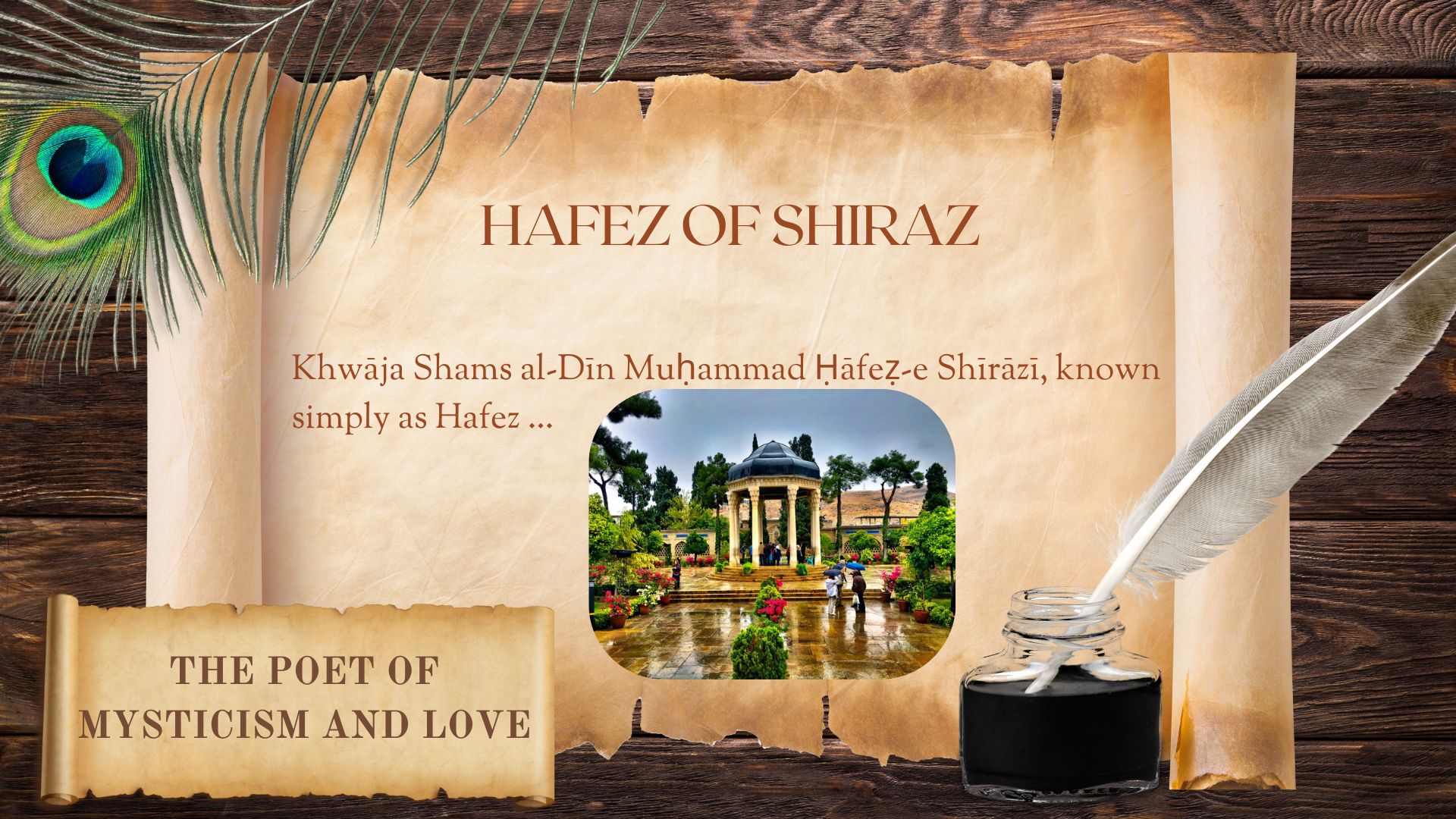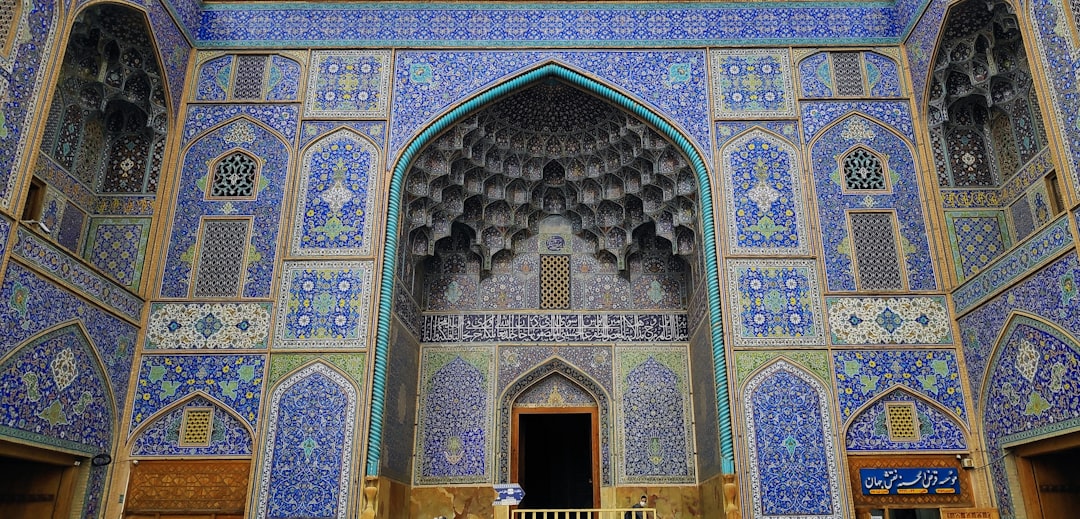There are loves that illuminate the world,
and there are loves that burn it down.
Saadi Shirazi, the gentle sage of Shiraz, sings of the second kind,
the love that refuses to die, that feeds on its own wounds,
that becomes both poison and cure.
تا بود بار غمت بر دل بیهوش مرا
سوز عشقت ننشاند ز جگر جوش مرا
نگذرد یاد گل و سنبلم اندر خاطر
تا به خاطر بود آن زلف و بناگوش مرا
شربتی تلختر از زهر فراقت باید
تا کند لذت وصل تو فراموش مرا
هر شبم با غم هجران تو سر بر بالین
روزی ار با تو نشد دست در آغوش مرا
بی دهان تو اگر صد قدح نوش دهند
به دهان تو که زهر آید از آن نوش مرا
سعدی اندر کف جلاد غمت میگوید
بندهام بنده به کشتن ده و مفروش مرا
His ghazal begins like the quiet confession of one who has long since surrendered to the flame:
“As long as the weight of your sorrow rests upon my senseless heart,
The fire of your love will not cease its boiling in my soul.”
Love here is not a passing fever. It is the slow, endless burn,
a heat that outlasts reason, sleep, and even time itself.
Saadi’s “senseless heart” is the mystic’s heart, stripped of logic,
emptied of self-preservation.
It beats not for its own life, but for the echo of the Beloved’s presence.
Every sigh becomes a flame; every tear, a spark in the dark.
This is the condition of divine love, the soul so overcome
that it no longer asks for relief.
To be healed would mean to forget the face of the One who wounded it.
And so, the poet chooses pain, as a way of remembering.
The Memory That Refuses to Fade
Saadi continues:
“The memory of flowers and hyacinths passes not through my mind,
While the memory of your curls and your ear’s curve remains.”
He speaks of the world’s beauty, the blossoms of the garden,
the scent of spring, and declares them powerless before a single lock of the Beloved’s hair.
What is the fragrance of a flower beside the whisper of her breath?
What is the garden compared to the curve of her ear?
In these lines, Saadi redefines the center of the universe.
The world of form, color, scent, delight, collapses into one focal point: the Beloved.
All things draw their beauty from Her.
Without Her, the garden is but dust;
without Her, even paradise is empty air.
This is not mere romantic devotion.
In the mystic’s tongue, the Beloved’s hair is the veil of divine mystery,
the “black thread” that binds the human soul to the Infinite.
The curve of the ear is not sensual; it is symbolic.
It is the shape of receptivity, the listening heart
that hears the music behind all creation.
To remember that curve is to live within the echo of eternity.
The Bitter Cup of Separation
“It would take a potion more bitter than the poison of your parting,
To make me forget the sweetness of your union.”
This is the paradox at the core of Saadi’s vision.
The pain of separation is unbearable,
yet even that pain carries the trace of union.
To forget it would require a poison stronger than death,
for death itself is but another veil between lover and Beloved.
Every mystic knows this truth:
the soul that has once tasted union can never truly return to forgetfulness.
The sweetness lingers, in the ache, in the silence, in every attempt to move on.
It is why saints weep and poets sing.
To lose love would be to lose the meaning of existence itself.
And so, Saadi drinks his bitter potion not to escape the Beloved,
but to remain drunk on Her memory.
Each tear he sheds is a form of remembrance,
each wound, a secret conversation with the divine.
Nights of Longing
“Each night I lay my head upon the pillow of sorrow for your absence.
If one day I could rest with you in my arms…”
The poet’s yearning is both earthly and celestial.
To rest with the Beloved in his arms could mean the human embrace,
but it also hints at a greater repose,
the moment when the soul at last merges with its Source.
Every night he lies awake, half-dreaming,
between sleep and prayer, between loss and hope.
This sleeplessness is sacred.
The mystics called it sahar, the hour before dawn,
when lovers of God cry in solitude,
their tears washing the heart like the sea before sunrise.
Saadi’s sleepless nights are not merely signs of sorrow.
They are acts of devotion.
To suffer without resentment, to yearn without despair,
this is the highest art of love.
The Taste of the Beloved
“Even if they offer me a hundred cups to drink without your lips,
From your lips alone would even poison taste like wine.”
Here the poem deepens into a paradox of pleasure and pain.
What is sweetness, Saadi asks, if it does not come from you?
What is life, if it is not shared in your breath?
To the worldly mind, these lines speak of passion,
the lover unable to enjoy life without his beloved’s kiss.
But the mystic hears something else:
the voice of the soul that has seen the face of God
and now finds all other joys empty.
Once the heart has known the Infinite,
no lesser ecstasy can satisfy it.
Even suffering, if it comes from the Beloved,
becomes its own kind of nectar.
The poison of divine love kills the ego, not the soul.
It destroys all that stands between the lover and the Loved.
Thus, Saadi’s “poison” is mercy in disguise.
The Slave of Love
“Saadi, before the executioner of your sorrow, declares:
I am your slave, kill me if you will, but never sell me.”
This final couplet seals the covenant of devotion.
Love, for Saadi, is not a contract, it is servitude.
But this servitude is joy.
It is the freedom of being possessed by the One who owns all things.
He asks not to be spared, not even to be sold to another master.
He wishes only to remain within the reach of that terrible, beautiful hand,
the hand that wounds and heals in the same motion.
To “sell” him would be to forget him, to cast him away.
To “kill” him, by contrast, is to complete the work of love,
for in the death of self lies the birth of union.
Thus, Saadi stands before the Beloved not as a victim but as a devotee.
His death is his offering; his surrender, his crown.
The Fire That Purifies
When Saadi speaks of pain, he speaks not of despair but of transformation.
The grief that runs through his verses is a fire that refines the soul.
Just as gold must pass through flame to reveal its true purity,
the lover must pass through sorrow to uncover the hidden joy beneath all things.
The mystic path is not for comfort-seekers.
It demands everything, your peace, your pride, your reason, your name.
What remains, when all else is burned away, is something simple and eternal:
Love itself, luminous and unbroken.
This is why Saadi, like Rumi and Hafez after him, often blurs the line
between earthly love and divine ecstasy.
He understands that the two are not opposites but mirrors.
Every human longing, when followed deeply enough, leads to the same source.
Every heartbreak, honestly endured, opens a doorway to God.
When Love Becomes Prayer
In Saadi’s world, prayer is not only the recitation of words.
It is the trembling of the heart in the dark,
the quiet endurance of longing.
Even sorrow becomes a form of worship.
When he says:
“As long as the weight of your sorrow rests upon my senseless heart,
The fire of your love will not cease its boiling in my soul,”
he is describing a spiritual furnace,
one that consumes illusion and forges truth.
To bear love’s weight is to live in remembrance.
To remember is to worship.
Thus, Saadi’s grief is not weakness.
It is the mark of one who has tasted eternity
and refuses to settle for anything less.
The Unforgetting Heart
What makes Saadi timeless is his ability to speak of divine love
through the language of human feeling.
He does not abstract love into metaphysics;
he lets it ache, weep, and tremble.
In his verses, the heart is not a symbol, it is a living organ,
bleeding and burning in real time.
And yet, through this pain, something radiant shines.
It is the unforgetting heart,
the heart that refuses to grow numb,
that would rather ache forever than forget even once.
The modern soul, surrounded by distractions,
often seeks to numb itself from longing.
We silence our yearning with noise,
mistake numbness for peace,
and call forgetfulness healing.
But Saadi reminds us:
to forget is to die before one’s time.
To remember, even painfully,
is to remain alive to beauty.
What the Lovers Teach
Saadi’s lovers are not sentimental dreamers.
They are alchemists.
They turn poison into wine,
absence into presence,
pain into prayer.
They understand that love’s fire is not meant to destroy,
but to purify.
The ego burns away; what remains is the soul, clear and indestructible.
This is the secret of all mystic poetry,
that what seems unbearable becomes sacred
when seen in the light of love.
The Silent Wisdom of Suffering
Saadi does not call for escape.
He calls for patience: sabr.
The kind of patience that glows in the dark.
He tells us that even when joy is gone,
and even when no comfort is left,
the Beloved is nearer than breath.
The mystic’s endurance is not stoic detachment
it is intimacy.
It is the knowledge that even the ache of separation
is the Beloved’s way of saying,
“I am still here, though you cannot see Me.”
The End of the Path
At the end of the ghazal, Saadi stands like a martyr of love,
offering himself wholly to what he cannot control.
He no longer bargains, no longer hopes for a reward.
He has become what he sought
a soul stripped of all but longing.
And in that longing, there is peace.
“I am your slave, kill me if you will, but never sell me.”
It is the cry of a heart that has found freedom in surrender.
The same flame that once tormented him now lights his way home.
The grief that once broke him has become his prayer.
This is Saadi’s gift to us
the reminder that every sorrow, if borne with love,
can become the very place where God is found.
In Saadi’s mirror, pain is not the enemy.
It is the teacher, the purifier, the bridge.
And the soul that endures, without losing tenderness,
without turning away
that soul, at last, learns the secret of all lovers:
that even in absence, the Beloved was never gone.





